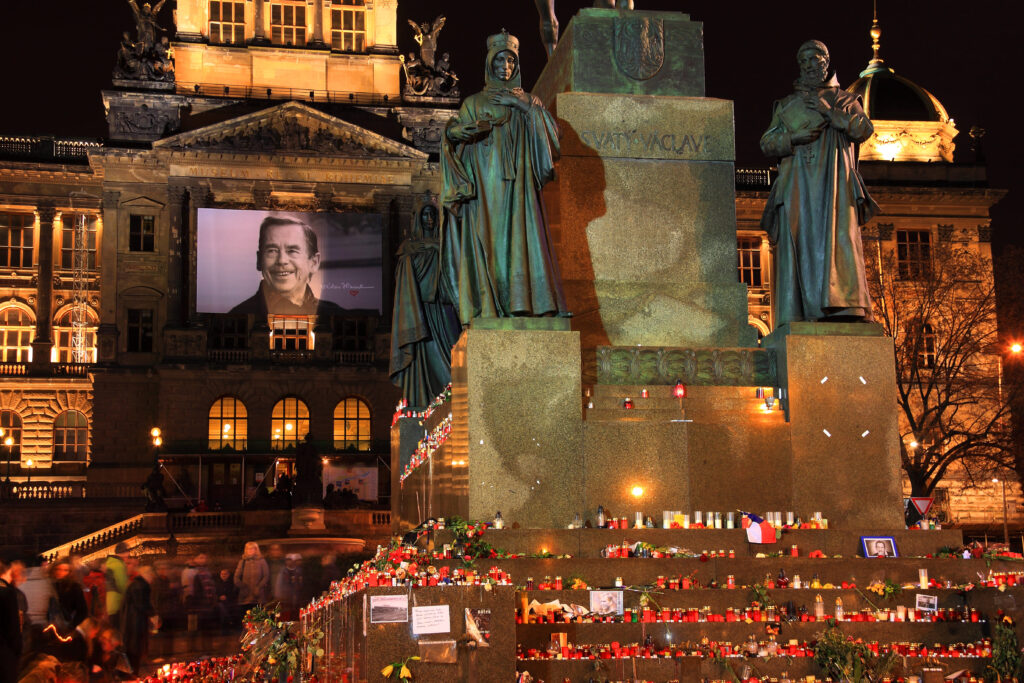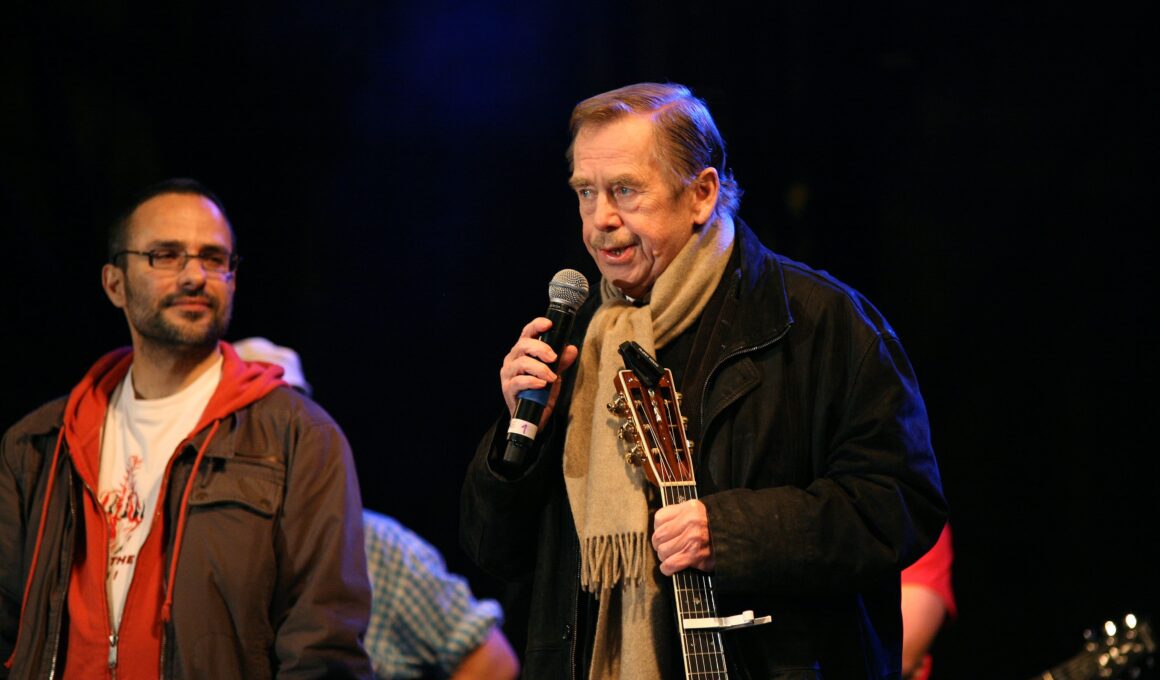Table of contents Show
Exploring the Inspiring Journey of a Czech Icon
Who was Václav Havel? When discussing the fight for freedom, equality, and human rights, the name Václav Havel immediately comes to mind. Havel remains to be among the most recognizable and respected personalities in Czech and international history. This article provides an in-depth answer to the question, “Who was Václav Havel?” by covering his life, death, dual legacy, and literary work.
The rise of Václav from dissident playwright to the first president of post-communist Czechoslovakia and then the first president of Czech republic is inspiring proof of what can be accomplished by bravery, perseverance, and a commitment to doing what is right.
If you have a passion for history and plan to travel to Prague, Václav Havel’s life serves as an inspirational testament to how one individual can effect significant change in the world, even when confronted with adversity. While in Prague, you might also explore historical events like the Battle of Bílá Hora to gain a deeper appreciation for the city’s rich history.
Unraveling Vaclav Havel’s Biography: Who Was Vaclav Havel?
According to Vaclav Havel’s biography, he was born to a wealthy and culturally diverse family in Prague, Czechoslovakia, on October 5, 1936. His biological father was a diplomat of note, and his mother was a published author. Václav gained a profound passion for literature and drama as a young man since he was raised in a community that valued these pursuits.
Havel started out on his artistic path in the 1950s when he enrolled at the Academy of Performing Arts in Prague and enrolled in the Faculty of Theatre. In his younger years, he devoted himself wholeheartedly to the stage and writing, and he was soon recognized as a talented playwright.
The Velvet Revolution and Vaclav Havel’s Role in Czech History

The Velvet Revolution, a nonviolent revolt in Czechoslovakia in 1989, was an important turning point in Prague’s rich history and a source of inspiration for democratic movements around the world. Václav Havel, a former political dissident and now a respected statesman, was a driving force behind the successful uprising that led to the Czech Republic’s independence.Vaclav Havel’s role in Czech history include:
Dissident Playwright
Before politics, Havel was a prominent playwright recognized for his thought-provoking and caustic works. His plays, notably “The Garden Party” and “The Memorandum,” satirized Communist life. His international reputation and intellectual position increased due to these efforts.
Dissident leader
The Czechoslovak dissident movement, led by Havel, opposed the Communist regime. He helped establish Charter 77, which demanded the government meet its international human rights obligations. Authorities harassed and imprisoned Havel for criticizing the regime.
Velvet Revolution
Havel’s best role in Czech history was leading the 1989 Velvet Revolution. The Communist state collapsed after the nonviolent rebellion. Havel’s moral power and eloquence inspired the masses, helping the revolution succeed.
Democratic transition
The Velvet Revolution made Václav Havel the president of Czechoslovakia and subsequently the Czech Republic. He guided the country through the difficult transition from totalitarianism to democracy. His leadership promoted democracy, human rights, and the law.
Moral Leadership
Havel’s strong morality and belief in social responsibility defined his administration. He advocated political reconciliation and citizen trust.
Global Human Rights Advocate
Havel promoted human rights and democracy worldwide outside of Czech politics. He got the U.S. Presidential Medal of Freedom and other foreign honors for his commitment to these beliefs.
Enduring Legacy
Václav Havel’s legacy lives on in the Czech Republic and worldwide. He represents strength, resilience, justice, and freedom. His life and achievements inspire freedom, democracy, and human rights advocates.
Vaclav Havel’s Passing: The Circumstances of His Death
Václav Havel’s death was on December 18, 2011. His passing brought an end to a magnificent life spent fighting for democracy, liberty, and human rights. Havel was an iconic playwright, rebel, and statesman. His death was a tragic loss not only for the Czech people but for all those who respected his unshakable dedication to these beliefs.
Health Challenges
Václav Havel’s health was a major issue in the years following his death. Prison life during the Communist era aggravated pre existing respiratory problems. In 1996, a malignancy forced the removal of one of his lungs. Despite his health problems, he kept working in public service and fighting for democracy and human rights.
Passing
Václav Havel, the former Czech president, passed away in the early hours of December 18, 2011, at his house in the rural community of Hrádeček. He was 75 years old. Complications from his long-standing health concerns ultimately led to respiratory failure, which ultimately led to his death.
A Statesman and a Writer: The Dual Legacy of Vaclav Havel
Václav Havel will be remembered as a statesman who had a significant impact on his country’s future and a writer whose thoughts and works continue to impart invaluable insight decades after his death.
The Statesman
Politically, Václav Havel will always be identified with the Velvet Revolution of 1989, a turning point in Czechoslovakia’s past and a symbol of nonviolent opposition against dictatorship. After the fall of communism in Czechoslovakia, Vaclav Havel became the country’s president. He is widely regarded as a champion of democracy, human rights, and the supremacy of law.
The Writer
Václav Havel’s literary reputation preceded his political career. The wisdom, humor, and dedication to the truth in his works of literature are still widely admired today.
Václav Havel’s achievements as both a political leader and an author are a testament to the fact that one person may have a global impact. All those who have faith in the resilience of the human spirit to triumph over adversity and promote the cause of freedom and equality should take heart from his life’s path from dissident dramatist opposing injustice to president representing optimism.
Exploring the Literary World: Books by Vaclav Havel
The complexity, wit, and dedication to the truth in much of Václav Havel’s writing continues to attract readers and shed light on his philosophical and political stances. Let’s take a look at some of books by Vaclav Havel:
“The Power of the Powerless” (1978)
Havel’s acclaimed works include this seminal essay. It’s an exploration of “living in truth” and personal accountability in a totalitarian state. This piece is a classic because of Havel’s analysis regarding authority and his plea for nonviolent resistance.
“Letters to Olga” (1983)
An excerpt from the 1983 book “Letters to Olga” The ones he wrote to his wife Olga during his time in prison provide a touchingly intimate glimpse into Havel’s life as a political inmate and dissident. They show his desire for independence and his unshakeable dedication to his values.
“Summer Meditations” (1991)
This anthology of essays, “Summer Meditations” (1991), examines the transformation of Czechoslovakia and the entire globe following the fall of Communism. Havel reflects on the difficulties and possibilities of a democratic society.
“To the Castle and Back” (2007)
From his early years as a dissident until his presidency, “To the Castle and Back” (2007), Havel’s memoir, offers an interesting look at his life. He discusses experiences, observations, and the difficulties of working in politics.
“Disturbing the Peace” (1986)
Havel’s autobiography “Disturbing the Peace” (1986) was written from prison and details his life as a rebel and his encounters with the Communist dictatorship. This shows how strongly he believes in liberty and human rights.
“Open Letters: Selected Writings, 1965-1990” (1991)
Politics, art, and the intellectual’s place in society are just a few of the many issues covered in this compilation of Havel’s essays. A complete picture of his intellectual and political development is painted here.
The works of Václav Havel are distinguished by their philosophical rigor, moral clarity, and dedication to the universal principles of democracy, truthfulness, and human rights. His works have inspired people who believe in the transformational power of literature and who are committed to the never-ending fight for freedom and justice.





